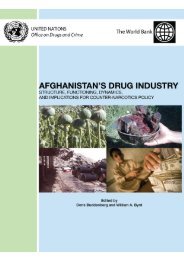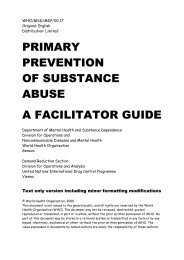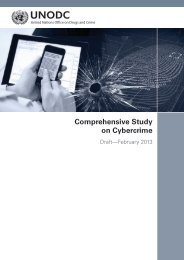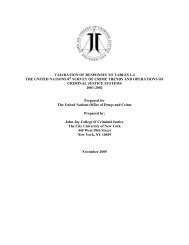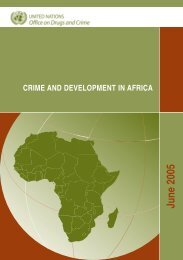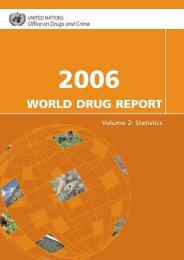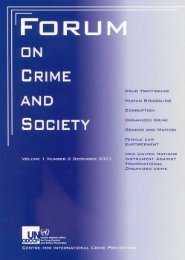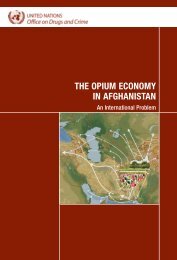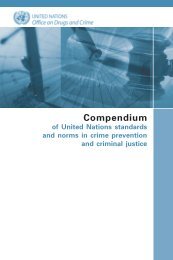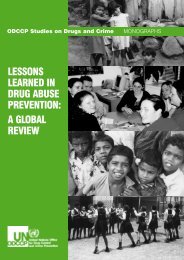Manual for Training Police on Anti Human Trafficking
Manual for Training Police on Anti Human Trafficking
Manual for Training Police on Anti Human Trafficking
You also want an ePaper? Increase the reach of your titles
YUMPU automatically turns print PDFs into web optimized ePapers that Google loves.
<str<strong>on</strong>g>Manual</str<strong>on</strong>g> <str<strong>on</strong>g>for</str<strong>on</strong>g> <str<strong>on</strong>g>Training</str<strong>on</strong>g> <str<strong>on</strong>g>Police</str<strong>on</strong>g> <strong>on</strong> <strong>Anti</strong> <strong>Human</strong> <strong>Trafficking</strong> 78<br />
Icebreakers: A game used at the beginning of a sessi<strong>on</strong> to enable group members to relax and<br />
mingle, to create trust within the group and to simply have fun. Due to the serious nature of<br />
the issue <strong>on</strong> which the facilitati<strong>on</strong> sessi<strong>on</strong> focuses (HT), ice breakers can be useful to build<br />
relati<strong>on</strong>s of trust and familiarize participants with <strong>on</strong>e another (See ‘Trust me’ and ‘Sorts’<br />
Icebreakers <strong>on</strong> pages 10-11, Module 1).<br />
Knowledge games: which give in<str<strong>on</strong>g>for</str<strong>on</strong>g>mati<strong>on</strong> to the players. Energizers or tensi<strong>on</strong> diffusers:<br />
games that can be played when the energy of the group is flagging or to diffuse tensi<strong>on</strong>. Trust<br />
or social development games: these help to create a safe atmosphere in the group.<br />
Group work<br />
Small groups carry out specific tasks or activities. These encourage people to share experience and<br />
knowledge, encourage participati<strong>on</strong> and develop a co-operative approach to working. Group work<br />
is good as a follow-up to case studies since many of the participants with policing background will<br />
most likely be reminded of similar experiences and you can encourage a type of ‘compare and<br />
c<strong>on</strong>trast’ group discussi<strong>on</strong> in which group members can offer tips, advice etc. to <strong>on</strong>e another based<br />
<strong>on</strong> their experience.<br />
Lecture/talk<br />
A presentati<strong>on</strong> of a subject by the facilitator. It does not involve facilitator participati<strong>on</strong>. While in<br />
most cases, the facilitati<strong>on</strong> is most effective when it actively involves and engages the participants,<br />
a <strong>on</strong>e-way lecture can be used in situati<strong>on</strong>s where you, the facilitator are giving a brief introducti<strong>on</strong><br />
<strong>on</strong> a new topic/issue and you need the participants to focus their attenti<strong>on</strong> <strong>on</strong> your words.<br />
Panel<br />
A discussi<strong>on</strong> am<strong>on</strong>g a few qualified people seated at a table in fr<strong>on</strong>t of the audience. Panel<br />
discussi<strong>on</strong>s are especially relevant if there is a guest speaker who has experience, authority or<br />
expertise in a particular area such as a survivor of trafficking, an NGO worker etc.<br />
Polarized views<br />
Views about an issue are polarized i.e. phrased to reflect extremely different views. Group members<br />
can work in pairs, with each individual acting as if they fully adopted <strong>on</strong>e of the points of view <str<strong>on</strong>g>for</str<strong>on</strong>g><br />
the exercise, despite their own views. Each pers<strong>on</strong> writes down all the arguments they can think<br />
of which support their positi<strong>on</strong>, without discussing it with their partner. The partners then start<br />
arguing their case. The trainer/facilitator lists the points in favour of each view by asking each<br />
pair in turn to c<strong>on</strong>tribute <strong>on</strong>e point, until all points have been collected.<br />
Projects<br />
Projects can be undertaken by individuals or by a group and involve making a detailed study of a<br />
subject <str<strong>on</strong>g>for</str<strong>on</strong>g> presentati<strong>on</strong> in a written or verbal <str<strong>on</strong>g>for</str<strong>on</strong>g>m. This gives initiative to the participants and is<br />
good <str<strong>on</strong>g>for</str<strong>on</strong>g> “discovery learning” which tends to enhance motivati<strong>on</strong>. Projects are very helpful in<br />
instances where the topics are very dense and complex such as the different <str<strong>on</strong>g>for</str<strong>on</strong>g>ms of trafficking<br />
addressed in Module One – here a project could aid to summarize the key points and thereby<br />
simplify otherwise complicated subject matter.<br />
Questi<strong>on</strong> and answer<br />
Questi<strong>on</strong> and answer sessi<strong>on</strong>s involve the trainer/facilitator asking questi<strong>on</strong>s <str<strong>on</strong>g>for</str<strong>on</strong>g> the facilitators<br />
to answer or vice versa. A Q&A quiz is useful at the end of modules to refresh and test the<br />
participants’ knowledge and also to prompt their level of attentiveness.<br />
Questi<strong>on</strong>naires<br />
A list of questi<strong>on</strong>s relevant to a topic. Can measure knowledge, attitudes or behaviour.




